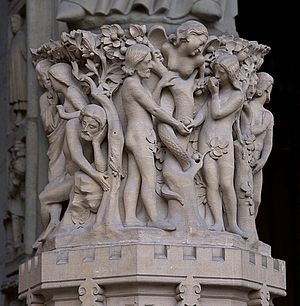
The fall of man, the fall of Adam, or simply the Fall, is a term used in Christianity to describe the transition of the first man and woman from a state of innocent obedience to God to a state of guilty disobedience.[1] The doctrine of the Fall comes from a biblical interpretation of Genesis, chapters 1–3.[1] At first, Adam and Eve lived with God in the Garden of Eden, but the serpent tempted them into eating the fruit from the tree of knowledge of good and evil, which God had forbidden.[1] After doing so, they became ashamed of their nakedness and God expelled them from the Garden to prevent them from eating the fruit of the tree of life and becoming immortal.[1]
In mainstream (Nicene) Christianity, the doctrine of the Fall is closely related to that of original sin or ancestral sin.[2] Nicene Christians believe that the Fall brought sin into the world, corrupting the entire natural world, including human nature, causing all humans to be born into original sin, a state from which they cannot attain eternal life without the grace of God. The Eastern Orthodox Church accepts the concept of the Fall but rejects the idea that the guilt of original sin is passed down through generations, based in part on the passage Ezekiel 18:20,[3] which says a son is not guilty of the sins of his father.
Reformed Protestants believe that Jesus gave his life as a sacrifice for the elect, that they may be redeemed from their sin. Lapsarianism, understanding the logical order of God's decrees in relation to the Fall, is divided into two categories: supralapsarian (prelapsarian, pre-lapsarian or antelapsarian, before the Fall) and infralapsarian (sublapsarian or postlapsarian, after the Fall).
The narrative of the Garden of Eden and the fall of humanity constitute a mythological tradition shared by all the Abrahamic religions,[1][4][5][6] with a presentation more or less symbolic of Judeo-Christian morals and religious beliefs,[1][4][7] which had an overwhelming impact on human sexuality, gender roles, and sex differences both in the Western and Islamic civilizations.[1] Unlike Christianity, the other major Abrahamic religions, Judaism and Islam, do not have a concept of "original sin", and instead have developed varying other interpretations of the Eden narrative.[1][2][5][8][9][10]
- ^ a b c d e f g h i
- Kvam, Kristen E.; Schearing, Linda S.; Ziegler, Valarie H., eds. (1999). "Hebrew Bible Accounts". Eve and Adam: Jewish, Christian, and Muslim Readings on Genesis and Gender. Bloomington, Indiana: Indiana University Press. pp. 15–40. doi:10.2307/j.ctt2050vqm.5. ISBN 9780253212719. JSTOR j.ctt2050vqm.5.
- Kvam, Kristen E.; Schearing, Linda S.; Ziegler, Valarie H., eds. (1999). "Jewish Postbiblical Interpretations (200 BCE–200 CE)". Eve and Adam: Jewish, Christian, and Muslim Readings on Genesis and Gender. Bloomington, Indiana: Indiana University Press. pp. 41–68. doi:10.2307/j.ctt2050vqm.6. ISBN 9780253212719. JSTOR j.ctt2050vqm.6.
- Kvam, Kristen E.; Schearing, Linda S.; Ziegler, Valarie H., eds. (1999). "Early Christian Interpretations (50–450 CE)". Eve and Adam: Jewish, Christian, and Muslim Readings on Genesis and Gender. Bloomington, Indiana: Indiana University Press. pp. 108–155. doi:10.2307/j.ctt2050vqm.8. ISBN 9780253212719. JSTOR j.ctt2050vqm.8.
- Kvam, Kristen E.; Schearing, Linda S.; Ziegler, Valarie H., eds. (1999). "Medieval Readings: Muslim, Jewish, and Christian (600–1500 CE)". Eve and Adam: Jewish, Christian, and Muslim Readings on Genesis and Gender. Bloomington, Indiana: Indiana University Press. pp. 156–248. doi:10.2307/j.ctt2050vqm.9. ISBN 9780253212719. JSTOR j.ctt2050vqm.9.
- ^ a b Tuling, Kari H. (2020). "PART 1: Is God the Creator and Source of All Being—Including Evil?". In Tuling, Kari H. (ed.). Thinking about God: Jewish Views. JPS Essential Judaism Series. Lincoln and Philadelphia: University of Nebraska Press/Jewish Publication Society. pp. 3–64. doi:10.2307/j.ctv13796z1.5. ISBN 978-0-8276-1848-0. LCCN 2019042781. S2CID 241611417.
- ^ Ezekiel 18:20
- ^ a b Leeming, David A. (June 2003). Carey, Lindsay B. (ed.). "Religion and Sexuality: The Perversion of a Natural Marriage". Journal of Religion and Health. 42 (2). Springer Verlag: 101–109. doi:10.1023/A:1023621612061. ISSN 1573-6571. JSTOR 27511667. S2CID 38974409.
- ^ a b Awn, Peter J. (1983). "Mythic Biography". Satan's Tragedy and Redemption: Iblīs in Sufi Psychology. Numen Book Series. Vol. 44. Leiden and Boston: Brill Publishers. pp. 18–56. doi:10.1163/9789004378636_003. ISBN 978-90-04-37863-6. ISSN 0169-8834.
- ^ Mahmoud, Muhammad (1995). "The Creation Story in 'Sūrat Al-Baqara," with Special Reference to Al-Ṭabarī's Material: An Analysis". Journal of Arabic Literature. 26 (1/2): 201–214. doi:10.1163/157006495X00175. JSTOR 4183374.
- ^ "Catholic Encyclopedia: Adam". www.newadvent.org.
- ^ Kolatch, Alfred J. (2021) [1989]. "Issues in Jewish Ethics: Judaism's Rejection of Original Sin". Jewish Virtual Library. American–Israeli Cooperative Enterprise (AICE). Archived from the original on 9 October 2017. Retrieved 10 April 2021.
- ^ Jarrar, Maher (2017). "Strategies for Paradise: Paradise Virgins and Utopia". In Günther, Sebastian; Lawson, Todd (eds.). Roads to Paradise: Eschatology and Concepts of the Hereafter in Islam. Islamic History and Civilization. Vol. 136. Leiden and Boston: Brill Publishers. pp. 271–294. doi:10.1163/9789004333154_013. ISBN 978-90-04-33315-4. ISSN 0929-2403. LCCN 2016047258.
- ^ Johns, Anthony Hearle (2006). "Fall of Man". In McAuliffe, Jane Dammen (ed.). Encyclopaedia of the Qurʾān. Vol. II. Leiden: Brill Publishers. doi:10.1163/1875-3922_q3_EQSIM_00147. ISBN 90-04-14743-8.